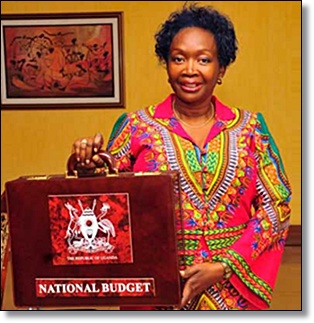Uganda: New Budget Favours the Rich

 |
| Uganda’s finance Minister, Maria Kiwanuka Photo courtesy |
The focus of conversation at the salon in relation to the budget turned to the aesthetic values of the minister who was reading the budget and those who were in the audience. We discussed the minister’s hair style, the colourful dress that she wore and the extent to which these were fitting for such an occasion. We critiqued the facial expressions of those in the audience, which we used to decipher the extent to which they understood what was being said by the minister, concluding that some were just us befuddled as we were. Most of all, our attention to the budget speech was dominated by the blonde wig that the Speaker wore. Its lack of aesthetic value aside, we wondered why the Speaker had to wear it.
Nevertheless, as the nimble fingers of my stylist worked away on my hair and amidst the conversation, I was able to capture some points that were being made by the minister. I was able to hear that the thematic focus areas for the budget were promoting economic growth, job creation and improving service delivery. The thought that came to my mind was the same old observation: Promoting economic growth for who? Job creation for whom? Service delivery for whom?
You see, more than the first half of the minister’s speech was on the review of the performance of the previous year. As the minister went on and on about how things had grown by this percentage and that rate ... we could not relate to what she was saying. The minister then gave the projections for the New Year - and they were meaningless to us in the same manner the speaker’s blonde wig was to us.
We, the ordinary Ugandans, have resigned ourselves to the meaninglessness of our country’s economic growth statistics; for the promotion of economic growth in Uganda is not based on equity. For example, every single incentive in form of the tax cuts that the minister gave in her speech can only be fully enjoyed if one is rich. The tax cuts on sugar and the reductions on stamp duty are only meaningful in the context of economies of scale. That is to say, it is he or she who is able to buy a truck-load of sugar that will enjoy the benefit of the tax cut, for by the time the sugar goes down through the retailer to the ordinary poor person who buys sugar in grams, there will be no significant impact. The ordinary poor person will probably not be able and will most likely not want to borrow in excess of Ush 1,000,000/=. So, how do they benefit from the reductions in stamp duty? The removal of taxes on kerosene, without dealing with the costs of fuel to transport the kerosene up-country will achieve zero impact. Removal of taxes on hoes is for me very comical, because on the conservative side, a hoe lasts multiple years. So for the millions of us who bought hoes last year, the positive impact of the tax exemption on hoes in our poor rural households is questionable.
Furthermore, are there really insufficient jobs in Uganda or we do not want to do the jobs that are there and need to be done? In 2009, of the 1,284 staff positions in Pallisa District administration, only 649 were filled, meaning that 49 percent of the staff positions were vacant. My regular visits to Pallisa indicate to me that the situation sustains and I dare say this is the case countrywide. The numbers of jobs that are currently vacant in the noble profession of farming for subsistence and for business are so huge. Need we be worried about job creation or should we address why the ‘unemployed’ do not want to work in Pallisa and in farming?
Sadly, until such a time as we address why our Speaker continues to wear a blonde wig, an outsider’s symbol of wisdom, the wisdom for a budget that favours the majority of Ugandans, shall continue to elude us.
By Norah Owaraga,
Director, Executive Support Services (ESS).
